英汉翻译(7)翻译中的增词与减词电子教案
第4讲_英汉翻译中的增词法和减词法(2014)
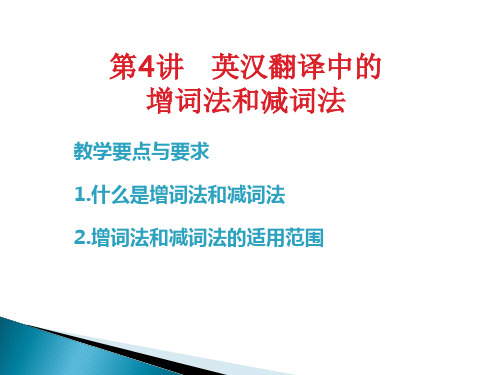
1.1 语法的需要(英汉差异)
1.1.3 增加量词
(1) To the east and the south a faint pink is spreading. 东南方呈现一抹浅红,正在向远处扩展。 (2) The sun rose thinly from the sea. 一轮红日从海边淡淡升起。 (3) A stream was winding its ways through the valley into the river. 一弯溪水蜿蜒流过山谷,汇到江里去了。 英语中没有量词,汉译时就得根据汉语的表达习惯增加合适 的量词。
Marry的宾语也可以不直接是人: She married a fortune. “她嫁了个有钱人”,(颇有点“傍大款”的意思。) She married into purple. “她嫁到了一个显赫之家”。
He married more than a hundred women but remained single all his life. ? “主持结婚仪式”或“证婚” Marry还有比喻用法 He married translation. “他终身致力于翻译” “他与翻译结下了不解之缘。”
.
解决方案
修改方案
advantage
有利地位
1.2 语义的需要(意义表达)
1.2.2 分词短语、独立结构
Using a transformer, power at low voltage can be transformed into power at high voltage. 如果使用变压器,低压电就能转换成高压电。 如果分词短语或独立分词结构含有时间、原因、 条件、让步等状语意义,翻译时可增加“当…… 时”、“……之后”、“因为……”、“由于……”、 “如果……”、“假若……”、“虽然……但……”等 词。
英文翻译技巧之增词法与减词法

英文翻译技巧之增词法与减词法英汉两种语言,由于表达方式不尽相同,翻译时既可能要将词类加以转换,又可能要在词量上加以增减。
增词法与减词法在英汉互译中运用相当广泛,但无论增词还是减词,增减的是词,不是意。
一、增词法所谓增词法,就是在翻译时,为了使译文合乎汉语的习惯和表达规律,为了使意思更加明确,从意义、修辞和句法上需要在译文中适当增添一些虽无其词而有其意的词。
增词译法不是凭空想象,必须增之有道,补之有理。
必要的增词对一个句子起着画龙点睛的作用,准确、通顺和完整地表达原文的内容,避免语义模糊。
例1:Packing together with packaging is designed not only as a form of protection but also a form to facilitate handling, storage, to prevent pilferage and what's more to help promote the sales.译文:包装和包装方法不仅仅是为了保护商品,也是为了便利搬运和库存、防止盗窃,更重要的是,有助于促销。
解析:“protection”此处译作“保护商品”,加了“商品”两字,显然比译作“保护”更好。
1.增加原文中省略的部分英语中有省略现象,译为汉语时往往要根据句法需要补出英文中省略的成分,主要包括回答中的省略、动词的省略及比较句中的省略等;另外,为表示态度、逻辑关系等,也需要加词。
(1)增补回答句中省略的词语1例2:—He doesn’t know, does he?—Yes, he does.译文:——他不知道吧?——不,他知道。
例3:—Did you enjoy your time in Beijing?—Yes, I did.译文:——你在北京过得愉快吗?——是的,我过得很愉快。
(2)增补并列结构中省略的词语例4:On average, the economy performs less well in a president's second term than in his first.That pattern probably does not apply to Mr Obama. Since his first term was so difficult, the next, by rights, ought to be better.译文:一般来说,美国总统第二个任期内的经济不如第一任期。
英汉翻译翻译中的增词与减词

随着语料库和机器学习等技术的不断发展,未来研究可以结合这些方法进行实证研究,以更加客观、准 确地揭示增词与减词的规律和特点,为翻译实践提供更加科学、有效的指导。
THANKS
感谢观看
减词适用场景
当原文中的某些词语在目标语言中显得冗余或不符合表达习惯时,可以通过减词来简化译文。例如, 在翻译某些过于详细或具体的描述时,可以适当省略一些次要信息,使译文更加简洁明了。
增词与减词的互补关系
增词和减词在翻译过程中相互补充,共同服务于译文的准确性和流畅性。通过适当运用增词和减词技巧,可以使译文更加符 合目标语言的表达习惯,提高译文的阅读体验。
在某些情况下,增词和减词甚至可以相互转化。例如,当原文中的某个词汇在目标语言中无法找到直接对应时,可以通过增 词的方式将其表达出来;而如果该词汇在目标语言中显得冗余或不符合表达习惯时,则可以通过减词的方式将其省略。这种 转化可以使译文更加自然、地道。
增词与减词在翻译实践中的
05
应用
文学作品翻译中的增词与减词
03
范畴词汇
英语中常使用范畴词汇来对事物进行分类或描述,而汉语则可能使用更
具体的词汇来表达相同的概念。在翻译时,可以省略范畴词汇,使译文
更加具体、生动。
减词实例分析
要点一
原句
We must take action to protect our environment from further damage.
英汉翻译中的增词与 减词
目录
• 引言 • 增词技巧及应用 • 减词技巧及应用 • 增词与减词的对比研究 • 增词与减词在翻译实践中的应用 • 结论与展望
01
引言
翻译的重要性
汉译英增词和减词演示文稿

▪ I am very glad to have received your writing.
▪ 2.没有调查就没有发言权。
▪ He who makes no investigation and study has no right to speak.
第14页,共22页。
Omission
▪ 一、省译汉语中重复出现的词语 ▪ 1我们要忠于党、忠于人民、忠于祖国。
▪ We should be loyal to our party, to our people and to our motherland.
第15页,共22页。
▪ 2.我们必须坚持社会主义道路,坚持人民民 主专政,坚持共产党的领导,坚持马列主义和 毛泽东思想。
▪ We must adhere to the socialist road, the people’s democratic dictatorship, the Communist Party’s leadership and MarxismLeninism and Mao Zedong Thought.
第5页,共22页。
▪ 连词:汉语重意合,英语重形合,把汉语翻译成英语 时,要适当增加连词。
▪ 1. 虚心使人进步,骄傲使人落后。
▪ Modesty helps one to go forward,
whereas conceit makes one lag behind. ▪ 2. 留得青山在,不怕没柴烧。
liked shopping in that small supermarket. ▪ 4. 我妈妈来了,我得回去了。
翻译中的增词和减词教学提纲

翻译中的增词和减词有人误以为,所谓合乎翻译标准,就是在把一种语言转换为另一种语言时,做到“不增不减”。
翻译实践告诉我们,由于两种语言表达方式上存在差异,翻译时往往都是“既增又减”。
这种根据各自语言特点,在具体上下文中适当地“增、减”,就是我们所要讨论的翻译技巧。
词量增减,是指根据原文上下文的意思、逻辑关系以及译文语言句法特点和表达习惯,在翻译时增加原文字面没有出现但实际内容已包含的词,或者减去原文虽有但译文语言表达用不着的词。
必须指出的是,词量增减必须防止两个倾向:一是添枝加叶,任意发挥;二是避难就易,肆意裁割。
1、增词增词,从理论上说可以增加任何词,但在什么时候增加什么样的词,才能恰到好处,而不超出一定界限,则需要悉心体会。
下面试分析几个译例:1)A book, tight shut, is but a block of paper.译文一:一本书,紧紧合上,只是一叠纸。
译文二:一本书,如果紧紧合上不读,只是一叠纸。
译文三:一本书,如果紧紧合上不读,只是一叠废纸。
译文四:闲置之书只是一叠废纸。
上面同一个句子四个译文,可以体现翻译不同层次。
译文一,与原文似乎丝丝入扣,但却显得支离破碎、关系不清、语意不足;译文二,增加了“如果……不读”,意思明白无误,只是觉得言犹未尽;译文三,又增加了一个废字,这可是点睛之举。
能否译出这个废字,是翻译这个句子的关键。
一个废字,说话者语意才得以充分表达。
译文三不足之处,就是行文拖沓累赘;而译文四则简明扼要,笔酣墨浓了。
2)Success is often just an idea away.译文一:成功往往只是一个念头的距离。
译文二:成功往往只是一念之差。
译文三:成功与否往往只是一念之差。
译文一让人看后莫名其妙;译文二改变说法,但仍让人似懂非懂,而译文三只是简简单单增加了一个“与否”,但却使人豁然开朗!原句意思表达得淋漓尽致。
如同文学翻译一样,经贸文字翻译增词现象也是千变万化。
英汉翻译中的增词法和减词法解析PPT学习教案
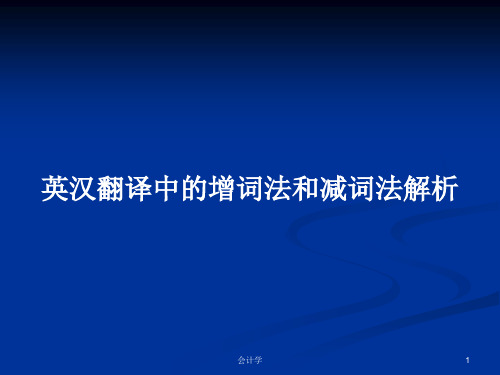
第13页/共50页
1.1 语法的需要(英汉差异) 汉语量词却是外国学生经常用错的地方。如:
“在果园里我们摘了五苹果。” “我们班上一学生病了。” 把“我给你一把锄头”说成“我给你一锄头”。 又如:把“一只鸟”说成“一条鸟”, 把“一张纸”说成“一个纸”。
第21页/共50页
1.2 语义的需要(意义表达)
1.2.2 分词短语、独立结构
Using a transformer, power at low voltage can be transformed into power at high voltage.
如果使用变压器,低压电就能转 换成高压电。
第19页/共50页
1.2.1 抽象名词
arrogance jealousy transition preparation tension backwardness
oxidation correctness hostility complexity madness remedy
自满情绪 嫉妒心理 演变过程 准备工作 紧张局势 落后状态
原文可改译为:
过去还从来没有发生过联邦调查局的退休特工 被指控同一些自以为聪明的家伙一起参与谋杀的 事。这样的事根本不应该发生,这太令人吃惊了。
第9页/共50页
原文:People all sympathized with her as she was married to a rich man and she loved a laborer on the farm
英汉翻译中的增词法和减词法解析
会计学
1
理据
英汉两种语言由于表达方 式不同,翻译时要在词量上进 行增减。
新编英汉翻译教程7 Amplification
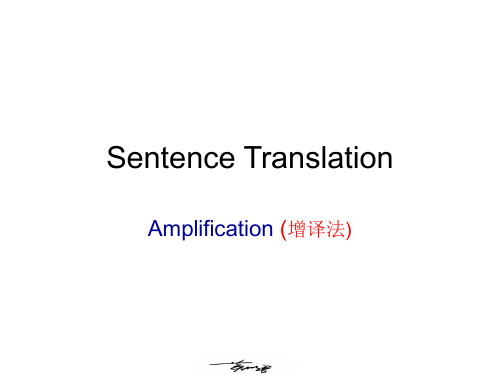
翻译技巧——增译法
2. 增加形容词或副词 1). With what enthusiasm the Chinese people are building socialism! 中国人民正以多么高的热情建设社会主义啊! 2). The crowds melted away. 人群渐渐散开了。 3). As he sat down and began talking, words poured out. 他一坐下来就讲开了,滔滔不绝地讲个没完。
翻译技巧——增译法
1、增加动词
1). Reading makes a full man; conference a ready man; and writing an exact man. 读书使人充实,讨论使人机智,笔记(写作)使人准确。 2) . We don’t regret, we never have and never will.
在那时候的电影里,总是老一套:男拖拉机手 和女拖拉机手始而相遇,继而相爱,终而并 肩开拖拉机了。
翻译技巧——增译法
3. 增加名词 1). First you borrow, then you beg. 头一遭借钱,下一遭就讨饭。 2). Mary washed for a living after her husband died of cancer. • 玛丽的丈夫癌症去世后,就靠洗衣服维持生 活。 3). He ate and drank, for he was exhausted. • 他吃了 点东西,喝了点酒,因为他疲惫不堪 了。
persuasion 说服工作 preparation 准备工作 backwardness 落后状态 tension 紧张局势 arrogance 自满情绪 madness 疯狂行为
英汉翻译中的增词法和减词法
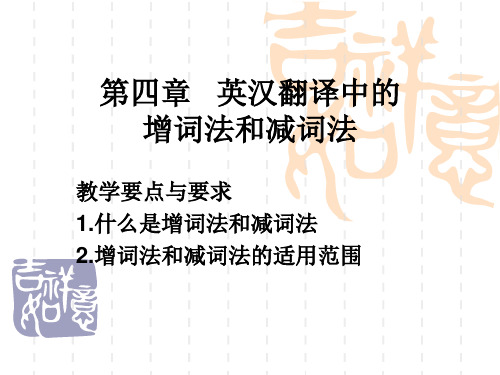
This great scientist was born in New England.
这位伟大的科学家出生在美国东北部的 新英格兰。
EX. 增加背景知识文化而增词
The blond boy quickly crossed himself.
▪ 导致合并不断增加的另一个因素是股票市场的空 前繁荣。股票市场的空前繁荣使得各家公司可以 依赖其上涨的股票价格去资助各种大规模的购进。
2.4 因语序变化而加词
▪ 由于英语国家惯用被动结构的语序,而我们 中国人惯用主动句,因而,在翻译中经常要增 加主语,使之变为主动语态,以适应我们的语 言习惯。例如:
因表达清晰自然之需而增词
❖ As to direct and indirect exporting, which approach is best depends on such factors as the company’s size, its export volume, the number of foreign countries involved, the investment required to support the operation, the profit potential, the risk present, and the desires of the overseas buyers.
▪ These drills want sharpening. ▪ 这些钻头需要磨一磨。
EX. 因语法需要而增词
▪ It is on one of these occasions that I met the Cartwrights. I was staying with a man named Gaze who was head of the police and he came into the billiardroom, where I was sitting, and asked me if I would make up a four at a bridgetable.
应用翻译实践L7-英汉翻译常用方法和技巧:增词删词及合并法

增词法
增词法就是在翻译时按照意义上(或修 辞)和句法上的需要增加一些词来更忠 实通顺地表达原文的思想内容。 增词不是无中生有的增加,而是增加原 文中虽无其词但有其意的一些词。
There were no speeches, no foreign diplomats, no “ordinary Chinese” with flags and bouquets of flowers. 没有发表演讲,没有外交使节到场,也没有老百 姓挥舞彩旗盒花束的场面。 They had been through it all by his side—the bruising battles and the humiliation of the defeat— until at last in 1945, they were able to savor the sweet taste of triumph. 他们始终站在他的一边,经历过残酷的厮杀,忍 受过失败的羞辱,终于熬到了1945年,他们才 尝到了胜利的甜头。
汉译英中的减词译法
1 省略范畴词 汉语中倾向于使用范畴词,如“现象”、“水平”、 “问题”、“状态”、“情况”等。这些词本身没有 实质意义,汉译英时可以省去不译。 中国足球的落后状态必须改变。 (The state of ) backwardness of Chinese football must be changed. 科学家与环保人士担心全球变暖的问题。 Scientists and environmentalists are concerned about (the problem of ) global warming. 必须清楚政府中的腐败现象。 We must clear away (the phenomena of ) corruption in the government.
汉译英增词和减词PPT课件

•教学目的要求:在汉译英中能熟练使用增词 法和减词法的翻译技巧。 •教学重点:增词法和减词法(代词和连词) •教学难点:汉语排比句的翻译,使用减词法。
第1页/共23页
• 一、为了保证语法结构的完整:
• 代词:汉语中有许多没有主语的句子,英语则一般需要主语。另外汉语中很多名 词前都没有代词,需要增补。
•1. 虚心使人进步,骄傲使人落后。 •Modesty helps one to go forward, whereas conceit makes one lag behind. •2. 留得青山在,不怕没柴烧。 •So long as green hills remain, there will never be a shortage of firewood.
We must make a comprehensive analysis of problem before it can be
第8页/共23页
• 二、为了保证译文意思更加明确。
• 文中暗含的意思:
•1.大家都知道朝鲜战场是艰苦些。 •Everyone knows that life on the Korean battlefield was rather hard. •2.要提倡顾全大局。 •We should advocate the spirit
英汉翻译中的增词法和减词法
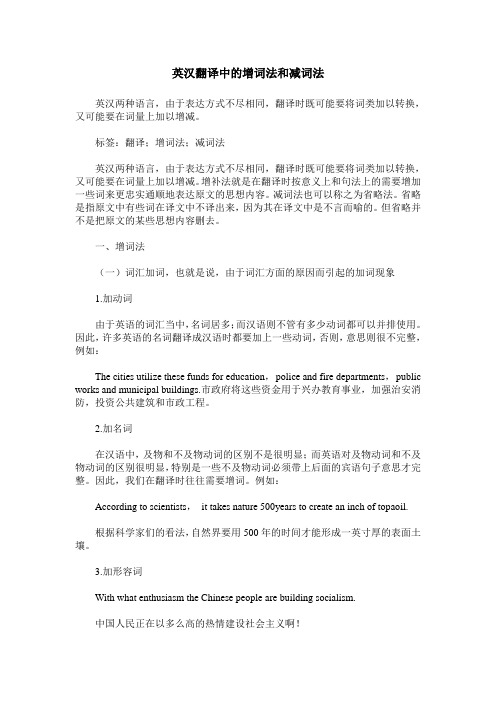
英汉翻译中的增词法和减词法英汉两种语言,由于表达方式不尽相同,翻译时既可能要将词类加以转换,又可能要在词量上加以增减。
标签:翻译;增词法;减词法英汉两种语言,由于表达方式不尽相同,翻译时既可能要将词类加以转换,又可能要在词量上加以增减。
增补法就是在翻译时按意义上和句法上的需要增加一些词来更忠实通顺地表达原文的思想内容。
减词法也可以称之为省略法。
省略是指原文中有些词在译文中不译出来,因为其在译文中是不言而喻的。
但省略并不是把原文的某些思想内容删去。
一、增词法(一)词汇加词,也就是说,由于词汇方面的原因而引起的加词现象1.加动词由于英语的词汇当中,名词居多;而汉语则不管有多少动词都可以并排使用。
因此,许多英语的名词翻译成汉语时都要加上一些动词,否则,意思则很不完整,例如:The cities utilize these funds for education,police and fire departments,public works and municipal buildings.市政府将这些资金用于兴办教育事业,加强治安消防,投资公共建筑和市政工程。
2.加名词在汉语中,及物和不及物动词的区别不是很明显;而英语对及物动词和不及物动词的区别很明显,特别是一些不及物动词必须带上后面的宾语句子意思才完整。
因此,我们在翻译时往往需要增词。
例如:According to scientists,it takes nature 500years to create an inch of topaoil.根据科学家们的看法,自然界要用500年的时间才能形成一英寸厚的表面土壤。
3.加形容词With what enthusiasm the Chinese people are building socialism.中国人民正在以多么高的热情建设社会主义啊!(4)加副词The crowds melted away.人群渐渐散开了。
英汉翻译中的增词法与减词法

增加名词
总结词
在英汉翻译中,当英语句子中缺少名 词时,需要增加相应的中文名词来完 整表达意思。
详细描述
例如,在英语句子"He is a good student."中,缺少中文名词"他"对应 的英文名词,因此需要增加"他"这个 名词,翻译为"他是一名优秀的学生。 "
增加动词
总结词
在英汉翻译中,当英语句子中缺少动词时,需要增加相应的中文动词来完整表达意思。
02 减词法概述
定义
减词法是指在翻译过程中,根据原文含义和语境,适当省略或简化某些词语,使 译文更加简洁、流畅。
减词法与增词法相对,是一种常见的翻译技巧。
原因
语言差异
英语和汉语在语法结构、表达习惯等方面存在较大差异,为 了使译文更加符合目标语言的表达习惯,需要进行适当的减 词。
信息传递
翻译的主要目的是传递原文的信息和意义,而非逐词逐句的 对应。因此,在不影响信息传递的前提下,可以适当省略或 简化某些词语。
在翻译文化负载词时,为了保留原文的文化内涵, 需要增加一些解释性的词语。
减词法
在翻译过程中,对于一些不必要或无法翻译 的文化信息,可以适当省略或简化。
信息传达差异
信息量
英汉两种语言在信息表达上存在差异,英语倾向于简 洁明了,而汉语则较为详细。
增词法
在英语译成汉语时,为了使译文信息完整,需要增加 一些细节或背景信息。
VS
省略物主代词
在英语中,物主代词"my/your/his/her" 等用于表示所属关系,但在汉语中,我们 通常省略物主代词,直接表达所属关系。
省略连词
省略并列连词
英汉翻译(7)翻译中的增词与减词电子教案

• 2) Kissinger felt that Rogers was quibbling, but the lawyer in Nixon supported the quibble of a fellow lawyer.
• 基辛格觉得罗杰斯在挑刺儿,但律师出 身的尼克松却支持他同行的挑刺儿。
(五)增加表示名词复数的词
• 1、增加重叠词表示复数
• 1) Very acute problems exist among them.
•
他们中间存在着种种非常尖锐的问题。
• 2) The US. had a brief period of regional feudalism during the period of slavery in the southern states.
• 2) He is a complicated man──moody, mercurial, with a melancholy streak.
• 他是个性格复杂的人——喜怒无常、反 复多变、具有忧郁寡欢的特点。
• C. after the abstract nouns
• 1) Nassar, with statesmanship and infinite patience, persuaded his quarrelling brother to sign an agreement.
what not, tinkling in his pocket. • 那小男孩口袋里带着小刀啦、剪子啦、等等。丁零当
啷响个不停。 • 3) Their host carved, poured, cut bread, talked, laughed,
英汉翻译中的增词法与减词法PPT课件
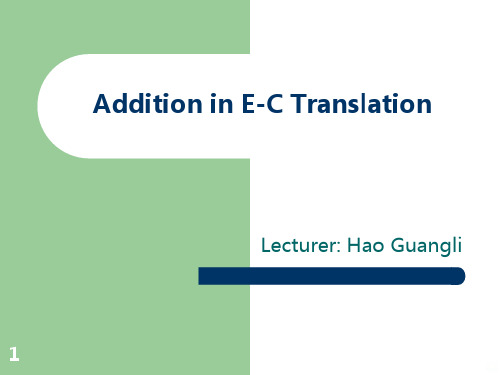
5
62019/10/20为了语法上的需要而增词(2)
7
5.Any leak, even at this late date, could have tremendous international repercussions.
8
II. For the sake of cultural background
1.The blond boy quickly crossed himself. 译文:那个金发小男孩立刻在胸前划十字,祈
2
Addition_ why
to conform to the grammar in Chinese to reproduce clearly and naturally to deepen the cross-cultural
communication
3
Section Five—Addition: I.For the sake of grammar
In English, ellipsis sentence is often used. Therefore, when this kind of sentence is translated into Chinese, it is necessary for us to add what has been omitted.
Addition in E-C Translation
Lecturer: Hao Guangli
汉译英增词和减词
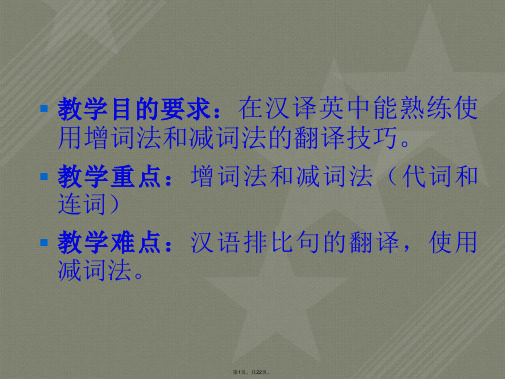
▪ 教学目的要求:在汉译英中能熟练使 用增词法和减词法的翻译技巧。
▪ 教学重点:增词法和减词法(代词和 连词)
▪ 教学难点:汉语排比句的翻译,使用 减词法。
第1页,共22页。
unemployment in that country.
2. 这些新型汽车速度快,效率高,行动灵活。 ▪ The new cars are fast, efficient and handy.
第19页,共22页。
▪ 3. 我们不后退,我们从来没有后退过,我们将 来也决不会后退。
▪ We won’t retreat, we never have and never will. 4 There was no snow, but the leaves were gone from the trees and the grass was dead.
▪ 2.三个臭皮匠,合成一个诸葛亮。
▪ Three cobblers with their wits combined equal Zhuge Liang the mastermind.
第10页,共22页。
▪ 3. 这对年轻夫妇并不相配,一个是西施,一个 是张飞。
▪ This young couple is not well-matched, one is a Xishi,--a famous Chinese beauty, while the other is a Zhangfei—a well-known ill-tempered brute.
Comrade Guo Moruo once said, “The people of China have always been courageous enough to probe into things, to make inventions and to make revolution.”
- 1、下载文档前请自行甄别文档内容的完整性,平台不提供额外的编辑、内容补充、找答案等附加服务。
- 2、"仅部分预览"的文档,不可在线预览部分如存在完整性等问题,可反馈申请退款(可完整预览的文档不适用该条件!)。
- 3、如文档侵犯您的权益,请联系客服反馈,我们会尽快为您处理(人工客服工作时间:9:00-18:30)。
啷响个不停。 • 3) Their host carved, poured, cut bread, talked, laughed,
proposed health. • 他们的主人割肉啦、倒酒啦、切面包啦、谈呀、笑呀、
(七)增加语气助词
• 1) All that made this Christmas Day was my knowing it was.
• 今天算是圣诞节,只是因为我知道是圣诞节罢了。 • 2) The little boy had brought with him knife, scissors and
getting away from all of them. • 他们从前总能控制一切,但现在他们大家在丧失控制了。 • 4) Stephen looked older than his age, for he had had a hard life. • 斯蒂芬看上去比他实际年龄要大,因为他曾有过一段艰难的生活。
敬酒祝福啦,忙个不也乐乎。
(八)增加名词单位词
• 1 ) This too was a complete lie. • 这也纯粹是一派胡言。 • 2) He squeezed his sister too and gave her a
gentle push. • 他也捏了一把他的妹妹,并且把她轻轻推了一
• 4) The lion is the King of animals.
• 狮是百兽之王。
• 5) The very earth trembled as with the tramps of horses and murmur of angry men.
• 连大地都颤抖了,万马奔腾,千夫怒吼。
(六)增加表示时态的词
• 4) The grief of the pe失去了控制。
• D. after the concrete nouns
• 1) The development of Chinese industry remains one of the priorities of the government.
Lecture Seven
•Amplification & Omission •翻译中的增词与减词
1. Amplification
• 英汉两种语言,由于表达方式不尽相同, 翻译时既可能要将词类加以转换,又可能 要在词量上加以增减。增词法就是在翻译 时按意义(或逻辑上)和句法上的需要增 加一些词来更忠实地表达原文的思想内容。 这当然不是无中生有地随意增词,而是增 加原文中虽无其词而有其义的词。
• 美国南部诸州,在奴隶制时期经历过短暂的地区封建制度。
• 3) They drove in a black limousine, past groves of birch trees and endless rows of identical new buildings.
• 他们开着一辆黑色的豪华轿车,通过一丛丛白桦树和一眼望不到尽 头的一排排千篇一律的新宅。
• 四月里,全世界听到中国“乒”的一声把球打了出去。七月里, 美国“乓"的把球打了回来。
• 2) The weather was warm and sultry and everyone seemed to be on edge.
• 天气闷热,所有的人都好象热锅上的蚂蚁,坐立不安。 • 3) His Hitler's discourse, says Speider, "became lost in fantastic
• 1) I knew it quite well as I know it now. • 我在当时就知道得同现在一样清楚。 • 2) Mother insisted to this day that she thought I was just joking. • 时至今日母亲还坚持认为我当时只是开玩笑罢了。 • 3) They had always been able to control things. Now control was
• 2) He is a complicated man──moody, mercurial, with a melancholy streak.
• 他是个性格复杂的人——喜怒无常、反 复多变、具有忧郁寡欢的特点。
• C. after the abstract nouns
• 1) Nassar, with statesmanship and infinite patience, persuaded his quarrelling brother to sign an agreement.
back. • 他把椅子转了个向,叉开双腿一屁股坐在上面,下巴搁在椅子背上。 • 4) In the films of those days, all too often it was the same one: boy
tractor driver meets girl tractor driver, they fall in love and drive tractors together. • 在那些日子的电影里,总是老一套。男拖拉机手和女拖拉机手始而 相遇,继而相爱,终而肩并肩地开着拖拉机走了。
October. • 这之前, 亨利·基辛格在七月和十月两度在这里下榻。
(十一)增加说明性的词语
• 1) The car stopped in front of the Nile Hilton.
• 轿车停在尼罗河希尔顿饭店的门口。 • 2) Oilfield Wives Farm the Gobi. • 油田工人的家属耕耘在戈壁滩。 • 3) Chen is 32 and mother of 2 . • 陈今年32岁,已有了两个孩子。
went. • 侵略军所到之处,掠夺财物,强奸妇女。 • 4) First you borrow, then you beg. • 一遭借钱,二遭讨饭。 • 5) Wash before you eat. • 吃饭前洗手。
• B. before the adjectives
• 1) This typewriter is indeed cheap and fine. • 这台打字机确实价廉物美。
the early light. • 虽然昨天遭受了暴风雨的袭击,庄稼在晨曦中显得郁郁葱葱,茂
盛异常。
(三)增加副词
• By supplying adverbs before some verbs. • 1) Now and then his boots shone. • 他的皮靴不时地闪闪发亮。 • 2) A seagull saw the light from the window and darted up to it. • 一只海鸥见到来自窗户光线便飞扑过去。 • 3) He turned a chair around and straddled it, resting his chin on the
(十)增加概括词
• 1) We have achieved rapid progress in industry, agriculture, commerce, education and culture.
• 我们在工业、农业、商业、教育和文化诸方面已经取得了迅速的发展。 • 2)The social systems of China and the US. are fundamentally
• 发展中国工业仍然是政府的首要课题之 一。
• 2) Kissinger felt that Rogers was quibbling, but the lawyer in Nixon supported the quibble of a fellow lawyer.
• 基辛格觉得罗杰斯在挑刺儿,但律师出 身的尼克松却支持他同行的挑刺儿。
下。 • 3) A red sun rose slowly from the calm sea. • 一轮红日从平静的海面上冉冉升起。
(九)增加根据上下文需要及反映 背景情况的词
• 1) In April, there was the "Ping" heard around the world. In July, the Ping "ponged."
different. • 中美两国的社会制度有着根本的差别。 • 3) The students of Classes 1 and 3 have gone to the factory. • 一、三两班的学生已经到工厂去了。 • 4) Henry Kissinger had slept there before, in July and again in
(四)增加名词
• A. after the intransitive verbs • 1) He began to see things and to understand. • 他开了眼界,并懂得了一些名堂。 • 2) He ate and drank, for he was exhausted. • 他吃了点东西,喝了点酒,因为他已疲惫不堪了。 • 3) The invading troops looted and raped whenever they
(五)增加表示名词复数的词
• 1、增加重叠词表示复数
• 1) Very acute problems exist among them.
•
他们中间存在着种种非常尖锐的问题。
• 2) The US. had a brief period of regional feudalism during the period of slavery in the southern states.
